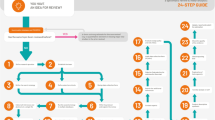Abstract
Health care providers have many options for obtaining answers to their questions about pharmaceutical products. These options include drug information curators and aggregators such as ePocrates, WebMD, and Wikipedia, as well as professional journals. However, drug information obtained directly from a pharmaceutical company is arguably the best source of information regarding that company’s medicine. This is because medical information (MI) professionals from the pharmaceutical industry have the product expertise, technical skills, and access to relevant information that enable current, evidence-based, and scientifically accurate information to be provided. Further, it is reasonable to assume that “good” information leads to better patient decisions and therefore better patient outcomes. Several factors are implicated in the use of a pharmaceutical company’s medical information resource. These factors include, but are not limited to, awareness of the availability of the resource, ease of access, and trust of the information. In this paper, the authors discuss the relevance of these factors and propose an integrated relational theory (referred to as the “MI Theory of Relativity”) to model the utilization and value of a medical information service.
Similar content being viewed by others
References
Manhattan Research. Taking the Pulse® U.S. Survey 2015. Decision Resources Group. New York, NY.
US Food and Drug Administration. Guidance for industry: Responding to unsolicited requests for off-label information about prescription drugs and medical devices (Draft Guidance) 2011. Washington, DC. http://www.fda.gov/downloads/Drugs/GuidanceComplianceRegulatoryInformation/Guidances/UCM285145.pdf?source=govdelivery. Published December 2011. Accessed November 27, 2015.
Santhouse A, Albano D. Evaluation of Wyeth medical communications written responses and the impact on prescribing. Drug Inf J. 2003;37:445–450.
Black P, Marsh C, Ashworth L. Assessment of customer satisfaction with verbal responses provided by a pharmaceutical company’s third-party medical information call center. Drug Inf J. 2009;43:263–271.
Fett R, Bruns K, Lischka-Wittmann SL. Results of a qualitative market research study evaluating the quality of medical letters. Drug Inf J. 2009;43:697–703.
Fung S, Merriman L, Cawley M. Assessing medical information needs via an internet-based survey. Drug Inf J 2009;43:509–518.
Sermo© WorldOne. Medical Information Awareness Survey, June 2014. New York, NY.
Clauson KA, Polen HH, Boulos MNK, Dzenowagis JH. Scope, completeness, and accuracy of drug information in Wikipedia. Ann Pharmacother. 2008;42:1814–1821.
Prescriptions Medicine Code of Practice Authority Code of Practice for the Pharmaceutical Industry 2015. http://www.pmcpa.org.uk/thecode/Documents/PMCPA%20Code%20of%20Practice%202015-NOV14_WEB.pdf. Accessed November 27, 2015.
Medicine Australia. Code of Conduct, 18th Edition 2015 https://medicinesaustralia.com.au/wp-content/uploads/sites/52/2010/01/20150617-PUB-Code-Edition-18-FINAL.pdf. Accessed November 27, 2015.
Brennan N, Edwards S, Kelly N, Miller A, Harrower L, Mattick K. Qualified doctor and medical students’ use of resources for accessing information: What is used and why?. Health Info Libr J. 2014;31:204–214.
Bennett NL, Casebeer LL, Kristofco RE, Strasser SM. Physicians’ Internet information-seeking behaviors. J Contin Educ Health Prof. 2004;24:31–38.
Google, Hall and Partners. Connecting with physicians online: searching for answers (US, November 2009). http://www.gstatic.com/ads/research/en/2009_ConnectingwithPhysiciansOnline.pdf Accessed December 2, 2015.
Davies K. The information-seeking behavior of doctors: a review of the evidence. Health Info Libr J. 2007;24:78–94.
Edelman Trust Barometer 2012. Annual Global Study. Global Results. http://www.slideshare.net/EdelmanInsights/2012-edelman-trust-barometer-global-deck Accessed November 29, 2015.
Edelman Trust Barometer 2015. Annual Global Study. Global Results. http://www.slideshare.net/EdelmanInsights/2015-edelman-trust-barometer-global-results Accessed November 29, 2015.
Manhattan Research. ePharma Physician® 2015 Survey. New York, NY.
Lum C, Ahn SM. The correction of product information in drug references and medical textbooks. Drug Inf J. 2012;46:94–98.
Soares SC, Marsh C. Metrics implementation in an industry-based medical information department and comparison to metrics tracked within other industry-based medical information departments. Drug Inf J. 2008;42:175–182.
Jaisinghani J, Patel S. Training new-hire medical information specialists in the pharmaceutical industry: A benchmarking survey. Therapeutic Innovation & Regulatory Science. 2013;47:356–362.
Cadogan A, Fung S. The changing roles of medical communications professionals: Evolution of the core curriculum. Drug Inf J. 2009;43:673–684.
Author information
Authors and Affiliations
Corresponding author
Rights and permissions
About this article
Cite this article
Albano, D., Soloff, A., Heim, K. et al. A Theory on the Relativity of Factors Impacting the Utilization of Medical Information Services From the Pharmaceutical Industry. Ther Innov Regul Sci 50, 554–559 (2016). https://doi.org/10.1177/2168479016640019
Received:
Accepted:
Published:
Issue Date:
DOI: https://doi.org/10.1177/2168479016640019




